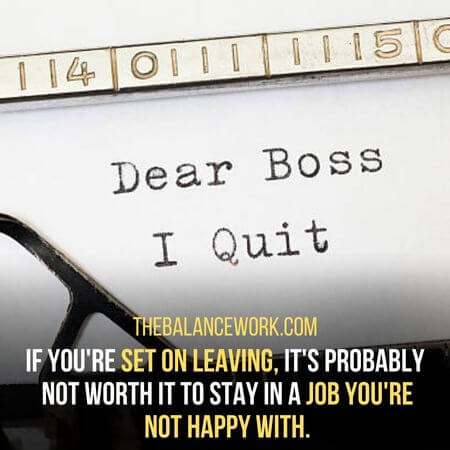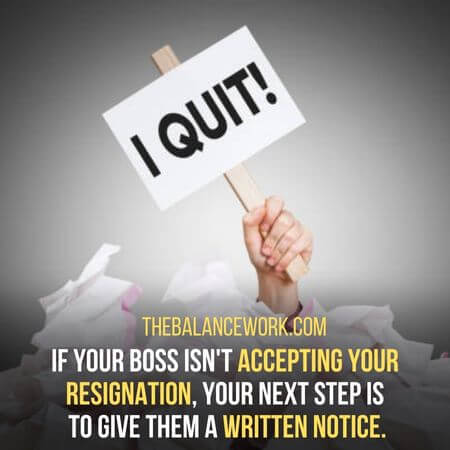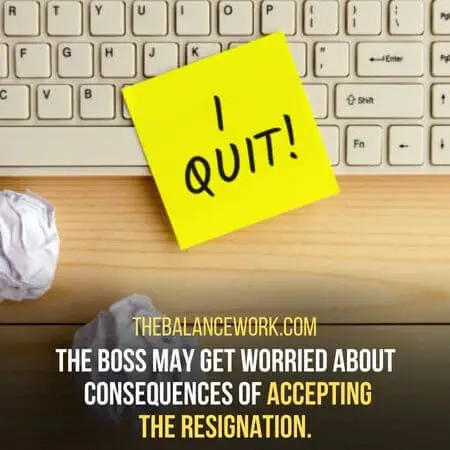What if the boss doesn’t accept the resignation? You might have to reconsider your decision to leave or find a new job.
Sometimes, staying put and working things out with your boss is best. Other times, it may be necessary to move on. It all depends on the situation.
What If The Boss Doesn’t Accept The Resignation?
You’ve put in your two weeks’ notice, but your boss doesn’t seem to be taking it well. They’ve asked you to reconsider your decision. What should you do?
Let’s find out some possible ways to deal with this tricky situation when planning to resign in workplace.
1. Stick To Your Guns And Don’t Budge:
If you’re sure that you want to leave, then it’s probably best to stick to your guns and don’t budge.
Your boss might try to convince you to stay. But if you’re set on leaving, it’s probably not worth it to stay in a job you’re not happy with.

Of course, you resigned after giving it a good thought. And now that your boss is trying to convince you to stay, the standing firm cannot be easy.
But you know that leaving is the best thing for you. Thus, it’s probably not worth staying because your boss doesn’t want you to go.
2. See If You Can Negotiate A Better Deal:
If you’re not entirely sure about leaving, you might want to try and negotiate a better deal.
This could involve asking for the following:
– A Raise
– More responsibility
– Better working hours
– Promotion, etc.
If your boss is unwilling to budge on any of these things, resigning is probably a good idea.
With a little negotiation, you might be able to improve your current situation.
Your attitude in this situation will be key. For example, if you are desperate to leave, your boss probably won’t be willing to negotiate.
However, if you handle the situation professionally, then you might be able to get what you want.
3. Give Your Company Another Chance:
You’re not happy with your current situation. It’s probably because something about your job is causing you stress.
Before you resign, try to figure out what that is. And see if there’s anything you can do to change it.
For example, maybe you’re not getting along with your boss. In that case, try to talk to them and see if you can work things out.
Or maybe you’re just feeling overwhelmed with work. In that case, try to talk to your boss about getting some help.
It might be worth sticking around if you can find a way to make your job more bearable.
Your resignation may be a last resort that you don’t want to take.
But it might be your only option if you’ve tried everything else and nothing has worked.
4. Let The CEO Know Or The Higher Management:
If your boss isn’t accepting your resignation, you might need to go over their heads.
There is a chance that your boss is just trying to make things difficult for you.
In that case, going to the CEO or higher management might be your best bet. This is because they will likely be able to give you a better idea of what your options are.
For instance, they might be able to offer you a severance package. Or they may accept your resignation without any issue.
Consider this if you’re struggling to get your boss to accept your resignation.
5. Give Them A Written Notice:
If your boss still isn’t accepting your resignation, then your next step is to give them a written notice.
This is a formal way of resigning from your job. And it will make it very difficult for your boss to ignore your resignation.

Be sure to include the date of your last day of work. Also, it’s a good idea to thank your boss for the opportunity to work at the company.
Your written notice should be concise and to the point. There’s no need to go into great detail about why you’re resigning.
And if you’re currently working on any projects, tell them who will be taking over for you.
6. Talk To HR:
If your boss isn’t accepting your resignation, you should talk to HR.
They will be able to tell you what your next steps should be. Your boss may be violating company policy by not accepting your resignation.
HR will be able to help you with that. They may also be able to help you negotiate a severance package if you’re leaving the company.
Meanwhile, your boss may come to accept your resignation after talking to HR.
HR has a lot of power in a company. And they may be able to convince your boss to accept your resignation.
7. Give Two Weeks’ Notice:
Even if your boss doesn’t accept your resignation, you should give two weeks’ notice.
This is standard practice and will help you transition out of your job smoothly.
Your boss may not be happy about it, but they will likely respect your professionalism.
Whatever you do, don’t just walk out without notice. This will reflect poorly on you and could damage your career.
Some bosses may be understanding and let you leave without notice. But this is rare.
Now you know what to do if your boss doesn’t accept your resignation. Next, it is time to discuss what not to do.
8. Don’t Argue:
If your boss doesn’t accept your resignation, don’t argue with them. They are likely feeling upset.
And they may not be in the right frame of mind to have a constructive discussion. So their first reaction may be to try to convince you to stay.
Don’t fall into the trap of arguing about why you want to leave or what is wrong with the company. This will not end well.
It may make your boss more resistant to accepting your resignation.
9. Don’t Get Emotional:
If you add an emotional element to the conversation, it will only make things worse.
Your boss is likely to be emotional too. They may feel betrayed or abandoned. And they may take out their emotions on you.
So, it’s best to avoid getting emotional yourself. Instead, keep your cool and stick to the facts.
State why you are leaving and when you will be available to help with the transition.
10. Be Prepared For The Consequences:
If your boss doesn’t accept your resignation, be ready for the consequences.
This could mean being fired or demoted. It could also mean a negative reference from your current employer.
So, it’s important to have a Plan B in place. Have a job lined up before you hand in your notice. And make sure you have enough money to cover your living expenses for a few months.
And it’s not pleasant to think about. But it’s also important to have a lawyer on retainer in case things get ugly.
It’s important to remember that, in most cases, your boss will accept your resignation. They may not be happy about it. But they will accept it.
So, don’t fret too much about what could happen if they don’t. Just be ready for the worst and hope for the best.
Why Bosses Don’t Always Accept Resignations
There are several reasons why bosses don’t always accept resignations:
1. Consequence:
The boss may get worried about the consequences of accepting the resignation. For example, they may get worried about what will happen to the company if a key employee leaves.

Or they may get worried about the impact on morale. For example:
Employees who see a key member of staff resigning may start to worry about their job security.
2. Timing:
The boss may not be ready to accept the resignation because it’s not a good time for the company.
For example, the company may be in the middle of a big project and can’t afford to lose any staff.
Or they may be short-staffed and can’t afford to lose another team member.
3. Change Of Heart:
The boss may think the employee will change their mind. For example, the boss may think the employee resigns because of a temporary problem. And they can fix that problem.
Whenever an employee resigns, the boss must find a replacement.
This takes time and effort. The boss may think the employee is just trying to get a pay raise or promotion by threatening to resign.
4. Good Terms:
The boss may want the employee to stay on good terms. So the boss can give them a good reference for future job applications.
Thus, the boss may try to convince the employee to stay. Or, the boss may accept the resignation but ask the employee to delay their departure date.
Whatever the case, it’s best to be ready with a response.
Can You Quit Without Notice?
It’s always best to give notice before quitting. But, sometimes, life doesn’t work out that way.
If you need to quit without notice, be ready for the consequences.
The boss may not be happy about it and could make things difficult for you in the future.

And when job hunting, future employers will ask why you left your last job without notice.
So, if you have to quit without notice, be ready to explain your decision.
Sometimes, an employer may accept the resignation. But they may ask the employee to delay their departure date.
Here are a few tips for quitting without notice:
1. Be Professional:
Even if you’re leaving on bad terms, remain calm and polite when you resign. Do not burn any bridges.
Before you quit, have a plan in place for what you’ll do next. This will help ease the transition and make it less stressful.
2. Smooth Things Over:
If possible, try to smooth things with your boss before resigning. This may help make the transition easier and prevent any hard feelings.
You may say, “I understand if you’re not ready to accept my resignation. But I would appreciate it if you could let me go as soon as possible.”
Then try to explain your reasons for resigning calmly and respectfully.
3. Offer to Help:
If your boss hesitates to let you go, offer to help with the transition. This may include training your replacement. Or helping out until a replacement is found.
You may also offer to work remotely if that’s an option. This can help ease your boss’s worries about the transition. In addition, it shows that you’re still committed to the company.
Final Word:
What if the boss doesn’t accept the resignation? You can try to negotiate a timeline, offer to help with the transition, or work remotely.
If your boss still doesn’t accept your resignation, you may have to consider other options. These include going to HR or looking for a new job.
Last Updated on 2 years ago by Eesha Khan
- Why Does My Boss Wink At Me? 6 Potential Reasons - October 5, 2023
- Is It Legal For Your Employer To Call Your Doctor? No, But… - October 4, 2023
- 12 Ways To Deal With A Low IQ Person - September 22, 2023